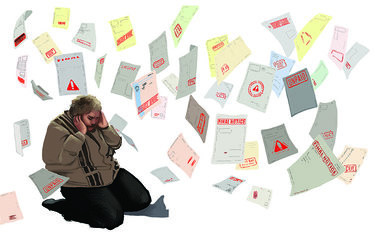Ignoring a problem won’t solve it
Concerns abound nationally and globally about democracy faltering.
Here at home, the rural Helderberg Hilltown, Berne, as of Aug. 13, has no government.
Three of the five town board members simultaneously resigned. This is no simple tussle between political parties; all five board members were elected on the GOP ticket.
We have written many times on this page about the struggles in Berne.
Unlike the Republican-backed candidates that took over Rensselaerville and Westerlo as a red wave swept the Hilltowns — all four towns have more enrolled Democrats than Republicans yet all four towns went for Donald Trump in 2016 — Berne’s GOP slates have come with an insatiable grievance against their Democratic predecessors — and now against one another.
“This grievance has played out in many different ways, but constitutes a mixed pattern of active self-defeat and lethargy that has placed the town on much less sure footing than its neighbors,” wrote our Hilltown reporter, Noah Zweifel, in his look back at 2023.
He went on to itemize the legal, financial, and ethical problems faced by the town just last year. But the history of poor governance is longer than that.
In 2021, the State Comptroller’s Office released an audit covering the entirety of 2020, when Republican Sean Lyons was supervisor and Republican Dennis Palow was deputy supervisor.
The audit report went on to clearly itemize the duties the board had neglected. The comptroller’s office made clear the role of the town board: “A board is responsible for the oversight of financial operations.”
But instead, what the auditors found in Berne, among other problems, was this: “The Board did not audit and review each claim to ensure it was a proper charge and adequately supported. The Supervisor did not provide the Board with adequate information to review claims. Further, the Board did not request support for claims because Board members were unaware what an audit of claims was.”
The Berne board routinely and unanimously voted to allow its supervisors, Lyons in 2021 and Palow in 2022, to pay bills. The exception to unanimous votes in 2021 was Joel Willsey, the lone Democrat on the board at the time.
Willsey, who did not seek re-election, often abstained from town votes because he said the other board members, all of whom had been elected on the Republican line, withheld information from him. “They refused to make bills and such available to me at meetings,” Willsey told The Enterprise.
A year later, the comptroller's office found that most of its recommendations were not followed and that Palow had lied to state officials.
In 2022, Zweifel got copies of unpaid bills from National Grid for the town hall, the senior center, the library, the pump station, the highway department, Switzkill Farm facilities, the town park, the transfer station, and the wastewater treatment facility.
When bills were paid, frequently the town paid less than what was owed. In one case, National Grid sent disconnection notices for service.
Such neglect of meeting financial obligations for services vital to residents is unacceptable, we wrote on this page in October 2022.
Equally troubling is that the town supervisor, Palow, and the town board members contacted by Zweifel did not respond to answer his questions on why the bills weren’t paid.
A democratic government is meant to serve the people, and the public deserves answers as to why the money residents have paid in taxes is not being used to meet the expenses of something as necessary as electricity.
One town board member, Albert Thiem, was at least willing to talk to Zweifel and said he was unaware of any issues with the town’s electric bills and, to his credit, Thiem agreed to have The Enterprise send him copies.
But really, elected town board members in any town should be aware of their duties in reviewing bills, as set down by state law, but particularly so in Berne after the comptroller’s office made specific recommendations — most of which were ignored.
We suspect the root of the problem was the dramatic property-tax cuts implemented by Lyons. He made decreases almost every year since he took office in 2016 and the roughly $3 million town budget for 2022 slashed town property taxes by 88 percent.
Berne meanwhile relied on a fund balance built up by former Democratic supervisors Kevin Crosier and Alan Zuk but then last fall hiked property taxes by over 700 percent.
Besides the comptroller’s report, other state-recognized areas of mismanagement included safety protocol at the town highway department, where a worker died in 2020; compliance with Open Meetings Law; and repeatedly hiring building department employees who did not have proper licensing.
At the same time, the board’s ethical and legal problems were highlighted at a crowded public hearing last year where Crosier attempted to speak. As the board members sat silently at the front of the auditorium, Palow ordered sheriff’s deputies to remove Crosier, which they did.
Crosier said he would not sue the town for the violation of his First Amendment rights if the town board apologized. No apology was forthcoming and a suit is now underway, with Crosier seeking at least $100,000 in damages.
Furthering the floundering of Berne’s democratic government, Berne residents had no choice at the polls last November. Even though Berne still had more enrolled Democrats (791) than Republicans (577), the Democrats ran no candidates.
As we wrote here at the time, people are powerless if the political enterprise is not competitive.
We know running for office and serving on a board in a small town can be hard. The Enterprise, in covering local elections for well over a century, can attest to the truth of the axiom: The smaller the town, the nastier the politics. Differences too often become personal attacks.
Nastiness in the 2021 Berne town elections, in which Democrats were soundly defeated, included allegations of animal abuse against the Democratic candidate for highway superintendent, farmer Barbara Kennedy, which the police proved false, and false information about the Democratic town clerk candidate Jean Guarino’s criminal history, who was arrested in the 1990s for a theft committed by her ex-husband.
In 2019, Palow had called for the three Democrats serving on the town board at that time to resign. By 2020, the Berne Town Board had spent over $15,000 fruitlessly investigating Democrats on the board.
Two of those Democrat-backed board members, Karen Schimmer and Dawn Jordan, finished their terms but did not seek re-election. The third, Joel Willsey, stayed on as the sole Democrat for two years, enduring frequent harassment. He said he was often not given the information needed to participate in meaningful governance.
Jordan’s response in 2019 to Palow’s call for the three Democrats to resign was this: “Apparently they have no idea what would happen if the three of us resigned.” She said there would be no quorum to act on any items and the board would not be able to function or even appoint new members.
That is precisely where the Berne Town Board finds itself today.
We commend the three board members who resigned on Aug. 13 — Al Thiem, Leo Vane Jr., and Joe Martin — for finally speaking out about their concerns.
The three had a lengthy session with Zweifel who details their troubles in our front-page story this week.
The three assert that town finances are in worse shape than the public is aware, and that Palow appears to lack any clear plan to address the issues while relying on a fear-based approach to control perceptions.
Similar to the claims made by Willsey, the three say they have been unable to access information essential to town governance with the breaking point coming when two of them said Palow declined to give them information on town finances.
Elected officials have an obligation to serve the public. We wish Thiem, Van, and Martin had spoken out earlier about their concerns; we believe the citizens of Berne would have been receptive.
Working together, as a majority on the board, they may have been able to see that finances were handled responsibly and that any lies were exposed. But we have seen how futile Willsey’s efforts were in this regard.
The central fault lies with Palow. As the town’s chief financial officer, he is required to share information with board members.
The state comptroller’s follow-up audit in 2023 found that 10 of its 11 recommendations were not followed. This included no financial reporting to the board, no board oversight of bank reconciliations, and no board documentation of approving claims.
Further, the audit found that Palow had lied to state officials. Palow told the auditors he had not read their report and so didn’t take corrective action. He claimed he reviewed monthly bank reconciliations prepared by the bookkeeper.
The auditors, however, found no evidence of Palow’s review on bank reconciliations, and went on to detail errors. There is no state enforcement mechanism for ensuring that the comptroller’s recommendations are followed.
That leaves solving this problem up to the citizens of Berne.
Democracy, as we all know, is a government powered by the people. The word itself comes from the Greek words for people — demos — and for power — kratos.
Abraham Lincoln put it eloquently when he spoke at Gettysburg in 1863, hoping that those who died on the battlefield had not died in vain. Rather, he opined, that the nation would “have a new birth of freedom and that government of the people, by the people, for the people shall not perish from the earth.”
If the governor calls an emergency election in Berne, we urge both parties to put up candidates so the people have the power of choice. We also urge those who are elected to communicate with the people they are meant to serve.
The elected supervisor has to share information with the other members of town government as well as with the public. It’s the only way democracy will survive.


